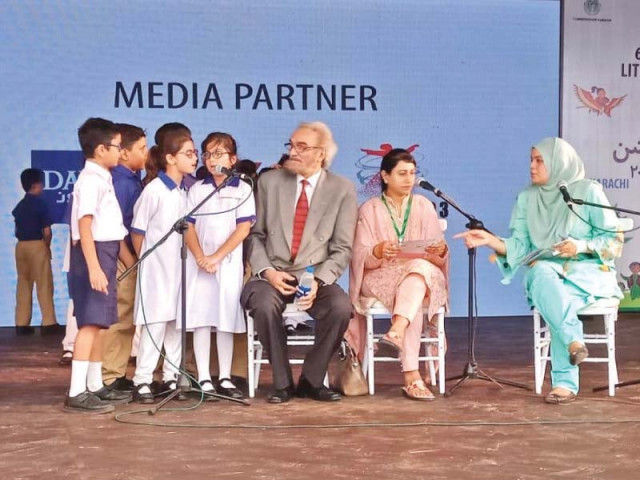‘Reading must be converted into social activity to compete in digital era’
Unlike traditional libraries, modern libraries facilitate discussions

Children interacted with renowned authors and participated in various activities on the second day of the Children’s Literature Festival on Thursday. PHOTO: EXPRESS
This was stated by veteran journalist, Zubeida Mustafa, who was speaking at a panel discussion, 'Popularising Libraries as Spaces for Active Learning Communities', on the second day of the Children's Literature Festival (CLF) being held at the Arts Council of Pakistan, Karachi.
The panelists included British Council's Head of Libraries and Digital Services Afnan Khan, Oxford University Press (OUP) Managing Director Arshad Hussain, and Nargis Sultana of the Open Society Foundation, with Baela Raza Jamil as the moderator.
"Traditional libraries are focused on silent reading only, without any noise in the designated space, but in modern versions of libraries, children learn through various ways like discussion over tea and through exploring the digital world," said Mustafa.
Children literature fest ends with calls for more
Parents need to encourage children to read hard copies of books in their formative years because children develop a relationship with physical existence of books. However, she admitted the importance of e-books and the digital world, which needed to be introduced later.
"Parents must keep a balance between digital interactions and book reading for their children because online forums provide condensed forms of knowledge while in-depth knowledge and information can be gleaned through books only, which includes e-book as well," she said.
She recalled her time in college when she used to borrow foreign writers' books from the British Council library for three months because the books were too expensive.
Mustafa suggested implementing late Miss Fikree's idea of a classroom library. "The initiative requires a shelf and a few books on it which can easily be managed by subject teachers," she added.
Jamil referred to Mustafa's article in a newspaper about libraries for which the journalist explored many libraries in Karachi and found that public libraries need to be updated.
OUP's Hussain shared his company's initiative of mobile libraries. "For the feasibility of children, mobile library is at the doorstep of people. Now they don't have to look for a library and travel far away to borrow books," he said.
Pakistani author wins big at Children's Indian Literature Festival
Briefing about various ways to increase awareness among children about libraries, Afnan Khan shared the British Council's contribution in the field. "We have created silent and discussion spaces in libraries because through the latter, activities can be initiated to engage children," said Khan.
He added that children learn through books while digital search engines are used for information. Khan also shared various ways of learning and discussion at libraries of the Council. "We have instrument club where children can bring their instruments to play. Besides, documentaries and sessions on Urdu are also regularly organised by the libraries," he said.
While the discussion was going on, Akbar Zia, an artist, sketched a live depiction of the conversation.
Another panelist, Nargis Sultana stressed for the elimination of rote learning from the education system because it destroyed the critical thinking ability of children.
According to her, reading beyond text books enhanced children's knowledge and fostered their critical abilities. "A discussion among stakeholders was held on the subject in 2010 in which it was decided to promote reading and writing through various festivals. CLF and mobile libraries are the outcome of the discussion," she added.
In response to a question from the audience about the preservation of culture through language, Sultana said that the Open Society Foundation is in the process to revive culture, heritage and language through publications. "We are also working on an initiative to organise mother language literature festivals," she added.
Developing reading habits
With the growth of digital platforms, it has become difficult to capture the interest of children in reading books, said The Educationist's Creative Head and Trainer Sidrah Rashid.
She shared these views in a session, titled 'How to develop reading habits in children?', at the CLF.
Attended by a few participants, the session was both discussion and activity-based.
With the help of Charles Duhigg's idea of habit cue, Rashid conducted activities, meant to develop the habit of reading among the audience.
"Duhigg's habit cues has five elements through which new habits can be inculcated among children. They include triggers, emotional appeal, physical environment, social impact and reward," briefed Rashid.
The trainer admitted that the role of social media in current times overrode reading habits. "Children and adults can connect with like-minded people on social platforms and create groups to discuss books," suggested Ali.
Published in The Express Tribune, August 9th, 2019.



















COMMENTS
Comments are moderated and generally will be posted if they are on-topic and not abusive.
For more information, please see our Comments FAQ